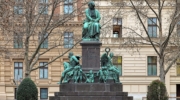Europa Nostra contributes to international symposium on the economic and social context of illicit trafficking in archaeological artefacts
Europa Nostra is proud to sit on the Advisory Board of ANCHISE, a European Union funded project (2023-2026) which aims to create a global and comprehensive response to the challenges faced in the protection of cultural heritage in Europe. On 8-9 November 2023, the first international symposium organised in the frame of the ANCHISE project entitled “The economic and social context of illicit trafficking in archaeological artefacts” was held at the University of Poitiers, France. The symposium gathered 35 speakers and a diverse audience composed of heritage and legal professionals from Europe and beyond. Europa Nostra was represented by its Policy Coordinator, Ted Oakes.
Great to be part of the @AnchiseProject symposium this week. Our Policy Officer Ted Oakes highlighted the interdisciplinary nature of the project, linking specialists in different fields – from archaeology to history, social science & law – which is key to protect our #heritage💬 pic.twitter.com/jvNP10lLei
— Europa Nostra (@europanostra) November 10, 2023
In his concluding remarks, Ted Oakes highlighted some of the main points shared over the two days of rich discussion.
While this is an historic problem, the illicit movement of cultural heritage from one region or territory is an older phenomenon, which communities of peoples and professionals have tried to mitigate. It is also a problem with many different layers and contemporary challenges. The identification of heritage from region to region can be very complex, in need of the expertise from museum professionals, art historians or archaeologists, and contemporary buy-and-sell dynamics drive the trade too. There are also increasing identifiable links with extremism and criminality which add further layers of complexity. It is also a problem not restricted to one part of the world, and all countries face challenges in addressing it, including in Europe.
But there are solutions too. Examples of campaigning archaeologists and dedicated local communities demonstrated the extent to which committed individuals and groups are dedicated to fighting this problem, and the potential of new technologies to understand this phenomenon was also shared. Civil society organisations – like Europa Nostra – can also play a role in raising awareness too and help strengthen cooperation as well. The overall aim of ANCHISE is to create tools for the better protection of cultural heritage, and Europa Nostra looks forward to being part of this project.






